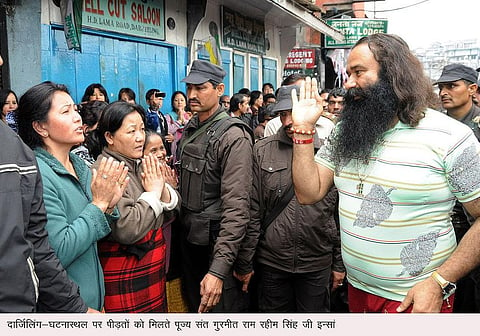
- Home
- न्यूजग्राम
- NewsGram USA
- India
- World
- Politics
- Entertainment
- Culture
- Lifestyle
- Economy
- Sports
- Sp. Coverage
- Misc.
- NewsGram Exclusive
- Jobs / Internships

New Delhi, August 28, 2017: The head of the Dera Sacha Sauda, Gurmeet Ram Rahim Singh recently had a trial and after the judgement was passed, his followers initiated violence in few cities of Haryana and Punjab. The government of Haryana failed to control the gathering of DSS followers in the place of the trial, Panchkula despite repeated advance warnings given by different security agencies.
The surprising fact was not the sexual exploitation and other criminal cases against him, but the way DSS followers were willing to die and fight for him.
The history of such Sufi cults or babas inspiring thousands of followers has been a part of north-western India for a long time. The question that arises is what is so distinctive about the structures of socio-political belonging to the society in that area which makes it possible for such centres of power to emerge?
For answering this question, a look at the region's historical trajectory and the present day's social and political structures. Punjab and Haryana, both have been through various foreign invasions which have caused a lot of chaos. The invasions did not allow the formation of socio-political structures for people to arrange their lives around. The people were deprived of stable socio-religious or political institutions. this was accompanied by the frequent destruction caused by the armies, which built a ground for Sufi cults or spiritual gurus to emerge. This gave people's lives a direction as well as a stable institution of support and social security.
The second reason which prompted the emergence of Sufi cults is the huge Dalit population and other minority castes present in that region. the comprise of a major portion of their followers. Haryana's neighbouring areas and Punjab, both have a huge population of Dalits, with their population touching 30% in Punjab, the highest in India. However, the Dalit population in the society's power structures is weak. This is due to highly skewed ownership of land in this region, wherein the power rests with the controllers of land. The caste system has played a huge part in depriving Dalits of the ownership of land. The Act of Alienation of Land enacted in 1990 created agricultural castes, including Muslims and Jat Sikhs mostly and they were made land allotments' sole beneficiaries under the widening of canal-colonies and agriculture. They were given preference during the selling of land and put restrictions on the selling of land to others, which included rural Dalits and upper-caste urban Hindus.
This further excluded them weaker artisans and Dalit from the platforms of decision-making. The Jat Sikhs started gaining dominance in Sikh institutions and other castes such as khatris started getting displaced. The conflicts of land owners with the agricultural labourers gave rise to religious fights. Dalits were not welcomed in Sikh temples or gurudwara, which made them take up an alternative, in which they not only comprised a huge proportion of the crowd but they were also represented in decision-making and management structure.
The development of deras gave rise to an alternative institution for various cultures. The most appealing aspect of these deras was their promise of treating all DSS followers equally irrespective of the caste. They provided economic support, free medicine along with human dignity and self-respect to people who had to hear their caste names being used as abuses in the society. An example of this would be DSS' local unit's head being called as "Bhangi Das". In a society where the word "Bhangi" is used to insult or abuse someone, this represents an act of pride, protest and the reclamation of the dignity of many broken people.
Such simple people's faith becomes vulnerable to dera heads and their machinations, who quickly develop an unholy connection with mafia and politicians. No wonder politicians have been courting such deras actively! This occurrence is attributed to two reasons- the first being the transformation of Dalits from landlords' dependents to wage labourers due to the fall of old feudal order and the Green Revolution. This provided the Dalits with an escape route to urban-industrial areas.
This loosened the control over Dalits by land owners and they had to look for alternatives to influence the votes of artisans castes and Dalits. Along with this, the democracy started deepening from the 1980s and the marginalised communities started gaining importance in politics. The politicians started approaching deras in order to win their votes as the obligation of democracy, "one man, one vote" policy and reservations made it impossible to ignore these castes in the process of elections.
The politicians never wanted to give a real say and stake to Dalits, therefore the only way to make them vote in their favour was to extend impunity and political patronage to the heads of deras.
However, the High Court asking to seize dera's properties and remove all its dependents is in one way, a misinterpretation of justice. The recently witnessed Jat agitation destroyed a lot more property but the judiciary didn't give an order to confiscate all Jat properties, or those belonging to the organisers or any other case for that matter. It is essential to investigate and punish the ones who are guilty.
We see various liberals and media houses are slamming the government that shooting more people will not have an impact on them as long as it is giving them additional talking points. A right mixture of statesmanship and state power is required if we want tp prevent long-run effects of destabilising and chaos.
-prepared by Harsimran Kaur of NewsGram. Twitter Hkaur1025
